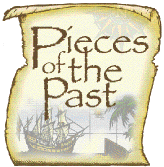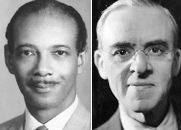A New Era In Jamaica's History


1938 - THE TURNING POINT
THE YEAR 1938 was a turning point in the history of modern Jamaica. Workers across the island began to demand better wages and working conditions and the colonial government had no choice but to listen. Strikes by the sugarworkers of Frome estate in Westmoreland, by the dockworkers of the Standard Fruit Company in Kingston, by farmworkers in Islington, St. Mary led to mass rallies and public meetings, the likes of which had never been seen on the island, not even the decade before
during the height of Garveyism.

In that year, workers around the island had recognized as their leader a tall, striking middle-aged man, with a shock of somewhat unruly hair that seemed merely a reflection of his unbridled energy.
The leader of these meetings and of the negotiations on behalf of the
workers was Alexander Bustamante. His charisma, bravado and sincere belief in the cause of the workers exemplified by his numerous letters to the newspaper and his willingness to be arrested and even shot for the cause, led him to acquire legendary status in his own time. In June 1938, not even a month after his release from being imprisoned for inciting unlawful assembling and obstructing a police inspector, Bustamante began converting the massive public support amongst workers all over the island into Jamaica's first recognized large scale trade union which would carry his name, the Bustamante Industrial and Trademen's Union, BITU.
The Movement Towards Political Organization
Meanwhile, his cousin, the renowned Oxford-educated Norman Manley from Roxborough, Manchester, who had mounted platforms to speak to workers upset about Bustamante's incarceration and attempted to keep the peace while he negotiated Bustamante's May release from jail, began to speak of the need for a political movement alongside the growing trade union one. This Manley believed was essential in order for Jamaica to achieve self-determination for Jamaicans. At a press conference in May, the tall, distinguished barrister announced that a number of committees were to be formed to propose solutions to debate ideas for Jamaica's development. It was these committees, he said, which would serve as the root of a genuine labour party. In this move towards national political organization Manley picked up on sentiments expressed as early as a decade before by skilled Jamaican orator Marcus Garvey who had attempted in his stirring public speeches and his US-based organization of the United Negro Improvement Association to better the condition of negroes everywhere. The events of 1938 were so monumentous that it was felt that a national political party had a better chance of survival as a result of the increased national awareness.
Manley did not act alone. Bustamante supported his efforts, but at that time was himself consumed with the organization of the BITU. O.T. Fairclough, a Jamaican who had managed a bank in Haiti and returned to his homeland to find the only job he could get was as an accountant at the Water Commission, became heavily involved impressing upon Norman the need for him to lead a political party. There was also the "Public Opinion," a weekly paper launched in 1937 by men such as Jamaica College history teacher Hedley Powell Jacobs to put forward views on the question of self-government. Jacobs was also a member of the National Reform Association (a group that began agitating for self-government in March 1938 and is considered ideologically to be a forerunner of the PNP) along with others such as Ken Hill and Noel "Crab" Nethersole. Florizel Glasspole (who eventually became Governor General 1973-1991) and future MP Wills O. Isaacs were also heavily involved. Of course there was also Norman's wife, renowned artist Edna Manley, whose art reflected ideals of self-determination. She supported him in his actions but maintained that no matter how many urged her husband to take up political leadership the final 
BY AUGUST 1938 Fairclough had made a name for himself travelling all over the island to recruit members such as businessmen, lawyers and members from established organizations such as the Jamaica Union of Teachers (JUT) and the Jamaica Agricultural Society (JAS).
A set of some 50 delegates were eventually selected and they appointed a steering committee of seven that included Norman Manley as chairman, accountant O. T. Fairclough as secretary, teacher H.P. Jacobs, lawyer N.N. Nethersole, Rev. O. G. Penso, architectural draftsman W. G. MacFarlane and Howard F. Cooke, a JUT representative (and the present Governor-General of Jamaica, the only member of that committee still alive). He remembers the excitement of the time and the almost missionary urge of wanting to effect change. The steering committee's task was to draft a founding constitution and prepare the party's formal launch slated for September
18, 1938 at the landmark Ward Theatre in downtown Kingston
 On the evening of September 18 the Ward Theatre was packed to capacity with the overflow spilling out onto North Parade. People of different political beliefs from different walks of life were present to listen to Norman Manley and British Labour Party MP, Sir Stafford Cripps, the guest speaker. Manley spoke of a new era in Jamaica's history, stressing the "tremendous difference between living in a place and belonging to it and feeling that your own life and your destiny is irrevocably bound up in the life and destiny of that place. Radical change was under way." In addition, he spoke of the need for collaboration between politics and trade unionism
On the evening of September 18 the Ward Theatre was packed to capacity with the overflow spilling out onto North Parade. People of different political beliefs from different walks of life were present to listen to Norman Manley and British Labour Party MP, Sir Stafford Cripps, the guest speaker. Manley spoke of a new era in Jamaica's history, stressing the "tremendous difference between living in a place and belonging to it and feeling that your own life and your destiny is irrevocably bound up in the life and destiny of that place. Radical change was under way." In addition, he spoke of the need for collaboration between politics and trade unionism

He explained, "I have never been a labour leader and I have no ambition to be a labour leader. All I have offered is the counsel of a friend of the new labour movement..." and emphasized the fact that the movement towards the creation of the political party was a team effort. "I want to tell you that I am not the author of this party. I have discovered that a considerable number of persons in the country have been thinking about it, have been dreaming about it, but it wan ted some convulsion to make it plain that such a thing was necessary...." Sir Stafford Cripps expanded on Manley's words and called the formation of the political party a progressive and bold move perhaps one of the most significant events of Jamaica's history.
The PNP set up its headquarters at Edelweiss Park, the former headquarters of Marcus Garvey's UNIA. A move was eventually made to South Camp Road and today the headquarters can be found on Old Hope Rd. in Kingston. The presidents of the PNP have been Norman Manley, Michael Manley and P.J. Patterson.
Sources: Bustamante, G. (1997) The Memoirs of Lady Bustamante. Kingston: Kingston Publishers Ltd. Black, C. V. (1983) The History of Jamaica. London: Longman Group UK Ltd., Sherlock, P. and Bennett, H. (1998). The Story of the Jamaican People. Kingston: Ian Randle Publishers. www.pnpjamaica.com/history_main
Special thanks to Troy Caine for his assistance with this piece
Congratulations @badmusolamide! You have received a personal award!
Click on the badge to view your Board of Honor.
Do not miss the last post from @steemitboard:
SteemitBoard World Cup Contest - Semi Finals - Day 1
Participate in the SteemitBoard World Cup Contest!
Collect World Cup badges and win free SBD
Support the Gold Sponsors of the contest: @good-karma and @lukestokes
Congratulations @badmusolamide! You received a personal award!
You can view your badges on your Steem Board and compare to others on the Steem Ranking
Vote for @Steemitboard as a witness to get one more award and increased upvotes!